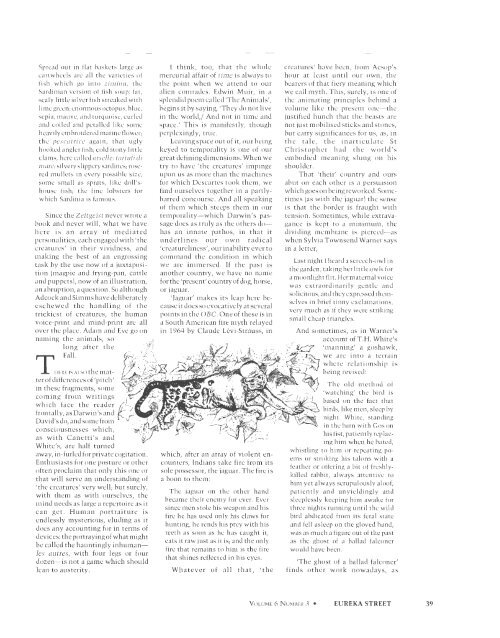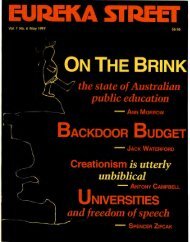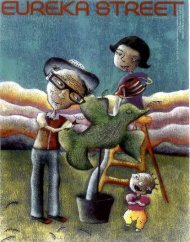Shane Malone - Eureka Street
Shane Malone - Eureka Street
Shane Malone - Eureka Street
Create successful ePaper yourself
Turn your PDF publications into a flip-book with our unique Google optimized e-Paper software.
Spread out in flat baskets large as<br />
cartwheels are all the varieties of<br />
fish which go into ziminu, the<br />
Sardinian version of fish soup: fat ,<br />
sca ly little silver fish streaked with<br />
Lime green; enormous octopus, blue,<br />
sepia, mauve, and turquoise, curled<br />
and coiled and petalled like some<br />
heavily embroidered marine flower;<br />
the pescatrice again, that ugly<br />
hooked angler fish; cold stony little<br />
clams, here ca lled arselle; tartufi di<br />
mare; silvery slippery sardines; rosered<br />
mullets in every possible size,<br />
some small as sprats, like doll'shouse<br />
fish; the fine lobsters for<br />
which Sardinia is famous.<br />
I think, too, that the whole<br />
mercurial affair of Lim e is always to<br />
the point when we attend to our<br />
alien comrades. Edwin Muir, in a<br />
splendid poem called 'The Animals',<br />
begins it by saying, 'They do not live<br />
in the world,/ And not in time and<br />
space.' This is manifestly, though<br />
perplexingly, true.<br />
Leaving space out of it, our being<br />
keyed to temporality is one of our<br />
great defining dimensions. When we<br />
try to have 'the creatures' impinge<br />
upon us as more than the machines<br />
for which Descartes took them, we<br />
find ourselves together in a partlybarred<br />
concourse. And all speaking<br />
of them which steeps them in our<br />
temporality-which Darwin's passage<br />
does as truly as the others dohas<br />
an innate pathos, in that it<br />
underlines our own radical<br />
'creatureliness', our inability ever to<br />
command the condition in which<br />
we are immersed. If the past is<br />
another country, we have no name<br />
for the 'present' country of dog, horse,<br />
or jaguar.<br />
'Jaguar' makes its lea p here because<br />
it does so evocatively at several<br />
points in the OBC. One of these is in<br />
a South An1erican fire m yth relayed<br />
creatures' have been, from Aesop's<br />
hour at least until our own, the<br />
bearers of that fiery meaning which<br />
we call myth. This, surely, is one of<br />
the animating principles behind a<br />
volume like the present one-the<br />
justified hunch that the beasts are<br />
not just mobilised sticks and stones,<br />
but carry significances for us, as, in<br />
the tale, the inarticulate St<br />
Christopher had the world's<br />
embodied meaning slung on his<br />
shoulder.<br />
That 'their' country and ours<br />
abut on each other is a persuasion<br />
which goes on being reworked. Sometimes<br />
(as with the jaguar) the sense<br />
is that the border is fraught with<br />
tension. Sometimes, while extravagance<br />
is kept to a minimum, the<br />
dividing membrane is pierced-as<br />
when Sylvia Townsend Warner says<br />
in a letter,<br />
Last night I heard a screech-owl in<br />
the garden, taking her little owls for<br />
a moonlight flit. Her maternal voice<br />
was extraordinarily gentle and<br />
solicitous, and they expressed themsci<br />
ves in brief tinny exclamations,<br />
very much as if they were striking<br />
small cheap triangles.<br />
consciousn esses which,<br />
as with Canetti's and<br />
White's, are half turned<br />
away, in-furled for private cogitation.<br />
Enthusiasts for one posture or other<br />
often proclaim that only thi one or<br />
that will serve an understanding of<br />
'the creatures' very well; but surely,<br />
with them a with ourselves, the<br />
mind needs as large a repertoire as it<br />
ca n ge t. Human portraiture is<br />
endlessly m ysterious, eluding as it<br />
does any accounting for in term s of<br />
device :the portraying of what might<br />
be called the hauntingly inhumanles<br />
autres, with four legs or four<br />
dozen- is not a game which should<br />
lean to austerity.<br />
which, after an array of violent encounters,<br />
Indians take fire from its<br />
sole possessor, the jaguar. The fire is<br />
a boon to them:<br />
The jaguar on the other hand<br />
became their enemy for ever. Ever<br />
since men stole hi s weapon and his<br />
fire he has used onl y his claws for<br />
hunting, he rends his prey with hi s<br />
teeth as soon as he has caught it,<br />
eats it raw just as it is; and the only<br />
fire that remains to him is the fire<br />
that shines re(lected in his eyes.<br />
Whatever of a ll that, ' the<br />
'watching' th e bird is<br />
based on the fact that<br />
birds, like men, sleep by<br />
night. White, standing<br />
in the barn with Gos on<br />
his fist, patiently replacing<br />
him when he bated,<br />
whistling to him or repeating poems<br />
or stroking his talons with a<br />
feat her or offering a bit of freshlykilled<br />
rabbit, always attentive to<br />
him yet always scrupulously aloof,<br />
patiently and unyieldingly and<br />
sleeplessly keeping him awake for<br />
three night running until the wild<br />
bird abdi ca ted from its fera l state<br />
and fell asleep on the gloved hand,<br />
was as much a figure out of the past<br />
as the ghost of a ballad falcon er<br />
would have been.<br />
'The ghost of a ballad falconer'<br />
finds other work nowadays, as<br />
V OLUME 6 N UMBER 3 • EUREKA STREET 39
















